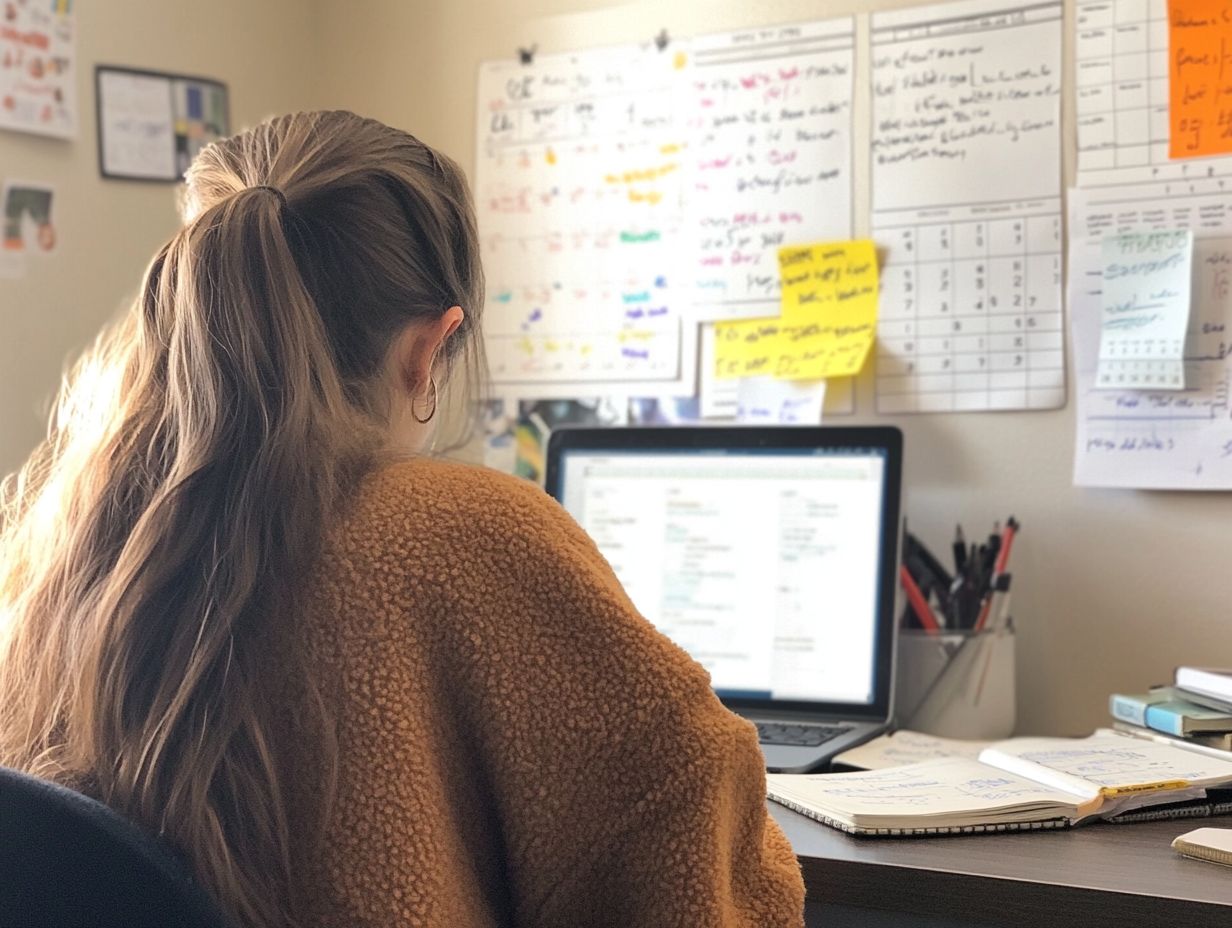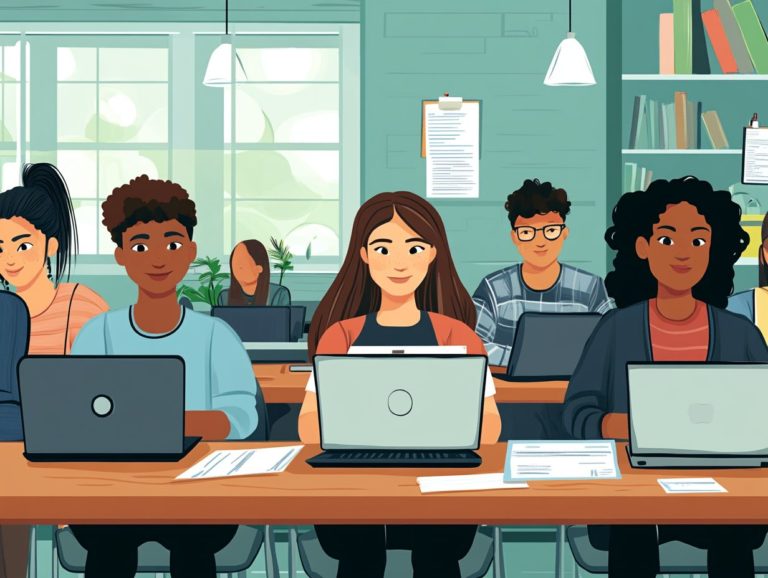5 Best Practices for Studying for Educational Certifications
Earning educational certifications can truly open doors to new career opportunities and personal growth. Therefore, your preparation process is vital for success.
This article delves into five best practices that can elevate your study efforts. These range from setting clear goals to nurturing your physical and mental well-being.
It highlights the benefits of certifications, explores the various types available, and outlines effective exam preparation strategies. You’ll also learn about common pitfalls to avoid and discover resources to keep you motivated.
Whether you re just beginning your journey or seeking to refine your approach, these insights will empower you to navigate the certification process with confidence.
Contents
- Key Takeaways:
- 1. Set Clear Goals and Objectives
- 2. Create a Study Schedule
- 3. Utilize Practice Questions and Exams
- 4. Collaborate with Others
- 5. Take Care of Your Physical and Mental Health
- What Are the Benefits of Earning Educational Certifications?
- What Are the Different Types of Educational Certifications?
- How Can One Prepare for the Exam Format of Educational Certifications?
- What Are the Common Mistakes to Avoid When Studying for Educational Certifications?
- What Are the Best Resources for Studying for Educational Certifications?
- How Can One Stay Motivated and Focused While Studying for Educational Certifications?
- Frequently Asked Questions
- Ready to ace your educational certifications? Here are five best practices to get you there!
- How can I create an effective study schedule for my educational certification?
- What are some different study methods I can use for educational certifications?
- How important is it to stay organized while studying for educational certifications?
- Is it beneficial to study with a group or partner for educational certifications?
- How can I avoid burnout while studying for educational certifications?
Key Takeaways:
- Set clear goals to guide your studies.
- Create a study schedule to manage your time.
- Use practice questions to boost your knowledge.

1. Set Clear Goals and Objectives
Setting clear goals and objectives is a crucial first step in mastering effective study methods. This is especially true for non-traditional students entering certificate programs or graduate school.
Clear goals help you manage your time better. By establishing specific and measurable outcomes, you can track your progress and maintain motivation throughout your educational journey.
Employing the SMART criteria ensuring your goals are Specific, Measurable, Achievable, Relevant, and Time-bound can significantly enhance your chances of achieving your desired results.
For example, instead of simply wishing to study more, set a concrete goal to complete four chapters of readings by the end of the week. This structured approach boosts accountability and sparks your engagement with the material, directly impacting your success in various academic settings.
2. Create a Study Schedule
Creating a structured study schedule is essential for effective time management. It enables you to allocate focused blocks of time for various study methods while accommodating your flexible format needs.
By implementing time-blocking techniques, designate specific periods throughout your day for particular subjects or tasks. This approach sharpens your focus and fosters a rewarding sense of accomplishment.
Consistency is key in reinforcing these habits. Dedicating the same time slots daily cultivates a routine that can significantly enhance your retention and understanding of the material.
To combat procrastination, utilize productivity tools like digital planners or task management apps they can be incredibly beneficial.
Optimize your study environment by reducing distractions and ensuring proper lighting. This creates a conducive space for concentration, ultimately leading to more productive study sessions.
3. Utilize Practice Questions and Exams
Utilizing practice questions and exams is a highly effective strategy. This enhances your recall performance through retrieval practice and spaced repetition, preparing you for actual test scenarios while also helping you develop essential skills gained from educational certifications.
Incorporate a variety of question types like multiple-choice, true/false, and open-ended formats to engage with the material from multiple perspectives. This diversity keeps your study sessions dynamic and equips you to tackle various styles of questioning in real assessments.
When faced with unique questions, you are challenged to think critically and apply your knowledge, fostering a deeper understanding of the subject matter.
Integrating these practice questions into your daily study routine supports active learning techniques. This makes your revisions more effective and helps to solidify the content in your memory.
Start implementing these strategies today to unlock new opportunities and achieve your certification goals!
4. Collaborate with Others

Collaborating with peers and tapping into faculty support significantly enriches your learning experience. Using active learning methods also opens doors to invaluable networking opportunities that can propel you both academically and professionally.
Engaging in group study sessions allows you to delve deeper into complex topics. You can exchange diverse perspectives and insights with your peers, sparking lively discussions that illuminate concepts and inspire new lines of thought.
Implementing effective collaboration strategies, such as assigning specific roles or rotating leadership within study groups, ensures that every participant plays an important role in achieving the shared goal of understanding.
Faculty support plays a crucial role in facilitating these interactions. Educators provide essential resources and guidance while fostering an inclusive atmosphere where every voice is valued.
By cultivating this collaborative environment, you sharpen your academic skills and develop crucial life skills like teamwork and communication. Don’t wait! Start collaborating today!
5. Take Care of Your Physical and Mental Health
To perform well in your studies, focus on your physical and mental health. Regular exercise, good sleep, and a healthy diet boost your brainpower.
By cultivating a routine that includes daily physical activities, you can invigorate your mind and prepare your body for intense learning sessions. Research shows that moderate exercise improves your focus and enhances memory retention, making it an invaluable ally in your study efforts.
Prioritizing restful sleep is equally important. It allows your brain to consolidate information and rejuvenates your overall mental health. Incorporating soothing music into your study time creates a calming atmosphere, facilitating deeper engagement with the material.
Using these strategies will set you on the path to academic success! These practices promote a balanced approach to mental well-being as you navigate educational challenges.
What Are the Benefits of Earning Educational Certifications?
Earning educational certifications can significantly enhance your career prospects and improve student outcomes, especially if you re a non-traditional student. These credentials provide valuable career assistance and broaden networking opportunities across various professional fields.
Not only do these certifications elevate your resume, but they also convey to employers a strong commitment to professional development and skill mastery. In industries like information technology, healthcare, and project management, having these credentials is often essential for landing higher-level positions and can lead to increased earning potential.
By obtaining these qualifications, you connect with industry professionals and mentors, unlocking exclusive networking channels that might otherwise be out of reach. This comprehensive approach boosts your employability and encourages continuous personal and professional growth, benefiting you as you navigate diverse career paths.
What Are the Different Types of Educational Certifications?
Educational certifications come in various forms, including professional certificate programs tailored by educational institutions to align with specific career paths and skill sets.
Among these options, diploma programs provide comprehensive training and are often preferred by those eager to delve into a particular field.
Meanwhile, online courses offer the flexibility that busy professionals crave, allowing them to enhance their expertise without the constraints of a traditional classroom.
Specialized training programs hone in on niche areas, giving you the power to acquire targeted knowledge that can significantly elevate your employability.
Each of these educational pathways is meticulously designed to address the diverse needs of various industries. This underscores the importance of thoughtful program design in delivering effective, meaningful content that truly resonates with the unique requirements of learners like you.
How Can One Prepare for the Exam Format of Educational Certifications?

Preparing for the exam format of educational certifications means you need a solid grasp of the structure and types of questions involved. This understanding allows you to tailor your study techniques accordingly and implement 5 essential tips for passing certification exams that feature unique questions.
Different exam formats, like multiple-choice and essay-based questions, require distinct approaches for effective preparation.
For instance, when tackling multiple-choice exams, memorization techniques and quick recall give you an edge. Essay-based assessments, on the other hand, call for critical thinking and coherent argumentation. Engaging in targeted practices specific to each format can significantly boost your readiness.
Reviewing is key! Understanding the exam layout and guidelines can greatly reduce anxiety and foster confidence. Familiarity with the format eases your nerves and enhances your time management during the test, ultimately maximizing your performance.
What Are the Common Mistakes to Avoid When Studying for Educational Certifications?
When studying for educational certifications, you may find yourself falling into common pitfalls that can impede your success, such as using ineffective study techniques, struggling with time management, and not fully taking advantage of the technique of recalling information. To avoid these issues, consider following the best practices for IT certification exam prep to strengthen your memory and improve your study approach.
These challenges often arise from procrastination and a lack of a structured plan. You might underestimate the time required for thorough review, leading to cramming the night before an exam, which typically results in heightened stress and less-than-stellar performance.
Create a study schedule that breaks your material into manageable chunks. Using digital calendars or reminder apps can enhance your discipline and foster consistent study habits.
Pairing this approach with techniques like flashcards or self-quizzing can improve your retention and understanding of the content, leading to a more organized and effective study experience.
What Are the Best Resources for Studying for Educational Certifications?
The finest resources for preparing for educational certifications encompass a blend of high-quality content, faculty support, and 5 key considerations for IT certification exams that elevate your learning experience.
Using a mix of resources such as comprehensive textbooks, interactive online courses, and stimulating study groups can deepen your understanding of complex subjects. These materials lay a solid foundation of knowledge while accommodating different styles and preferences.
Engaging with peers and faculty members through active networking can unlock valuable insights and shared experiences. This collaborative atmosphere nurtures motivation and encouragement, fostering a sense of community that reinforces the material being studied.
Ultimately, leveraging these interconnected resources enriches your educational journey, making it more effective and rewarding!
How Can One Stay Motivated and Focused While Studying for Educational Certifications?
Staying motivated and focused while pursuing educational certifications is crucial! You can achieve this through best practices for studying for business certifications, effective study techniques, a supportive study environment, and strategies to eliminate distractions.
To embark on this journey, set personal goals that are specific, measurable, achievable, relevant, and time-bound (SMART). This will help you maintain focus as you work toward each milestone.
Using tools like calendars and task management apps can significantly enhance your time management, allowing you to structure your study sessions for maximum productivity.
Creating a distraction-free study space equipped with essential materials and comfortable seating can enhance your concentration.
Incorporate regular breaks into your study routine; these short pauses refresh your mind, leading to better retention and sustained motivation!
Frequently Asked Questions

Ready to ace your educational certifications? Here are five best practices to get you there!
The 5 best practices for studying for educational certifications are:
- Creating a study schedule and sticking to it
- Using different study methods, such as flashcards and practice tests
- Staying organized and tracking your progress
- Taking breaks and ensuring you get enough rest
- Working with a study group or partner for motivation
Experiment with these methods and find what works best for you!
How can I create an effective study schedule for my educational certification?
To create an effective study schedule, you should:
- Identify the amount of time you have before the certification exam
- Break down the material into smaller, manageable chunks
- Allocate specific study times for each topic or section
- Include breaks and rest periods in your schedule
- Stick to your schedule and adjust as needed
By following these steps, you ll set yourself up for success!
What are some different study methods I can use for educational certifications?
Some effective study methods for educational certifications include:
- Flashcards, which help reinforce memory through quick recall of key facts
- Practice tests that enhance understanding and retention
- Note-taking to summarize and organize information effectively
- Teaching the material to others to solidify your understanding
- Creating study guides or outlines to review key concepts
Try these methods out and see which ones resonate with you!
How important is it to stay organized while studying for educational certifications?
Staying organized can supercharge your study sessions! This includes:
- Keeping track of study materials and notes
- Maintaining a study schedule and sticking to it
- Organizing study groups or partners for collaborative learning
- Tracking your progress and identifying areas needing more focus
- Creating a calm and clutter-free study environment
Your organization can make all the difference in your study routine!
Is it beneficial to study with a group or partner for educational certifications?
Yes! Studying with a group or partner can be incredibly beneficial. It allows for:
- Working together and discussing the material
- Sharing different perspectives and understanding of concepts
- Holding each other accountable for your study sessions
- Teaching and learning from one another
- Providing support and motivation during the study process
So, grab a buddy and start studying together!
How can I avoid burnout while studying for educational certifications?
To avoid burnout, you should:
- Take regular breaks and rest periods to recharge
- Get enough sleep and maintain a healthy lifestyle
- Rotate studying between different topics to keep it fresh
- Use various study methods to maintain interest
- Reach out for support from friends, family, or a study group
Your well-being is key to effective studying!






